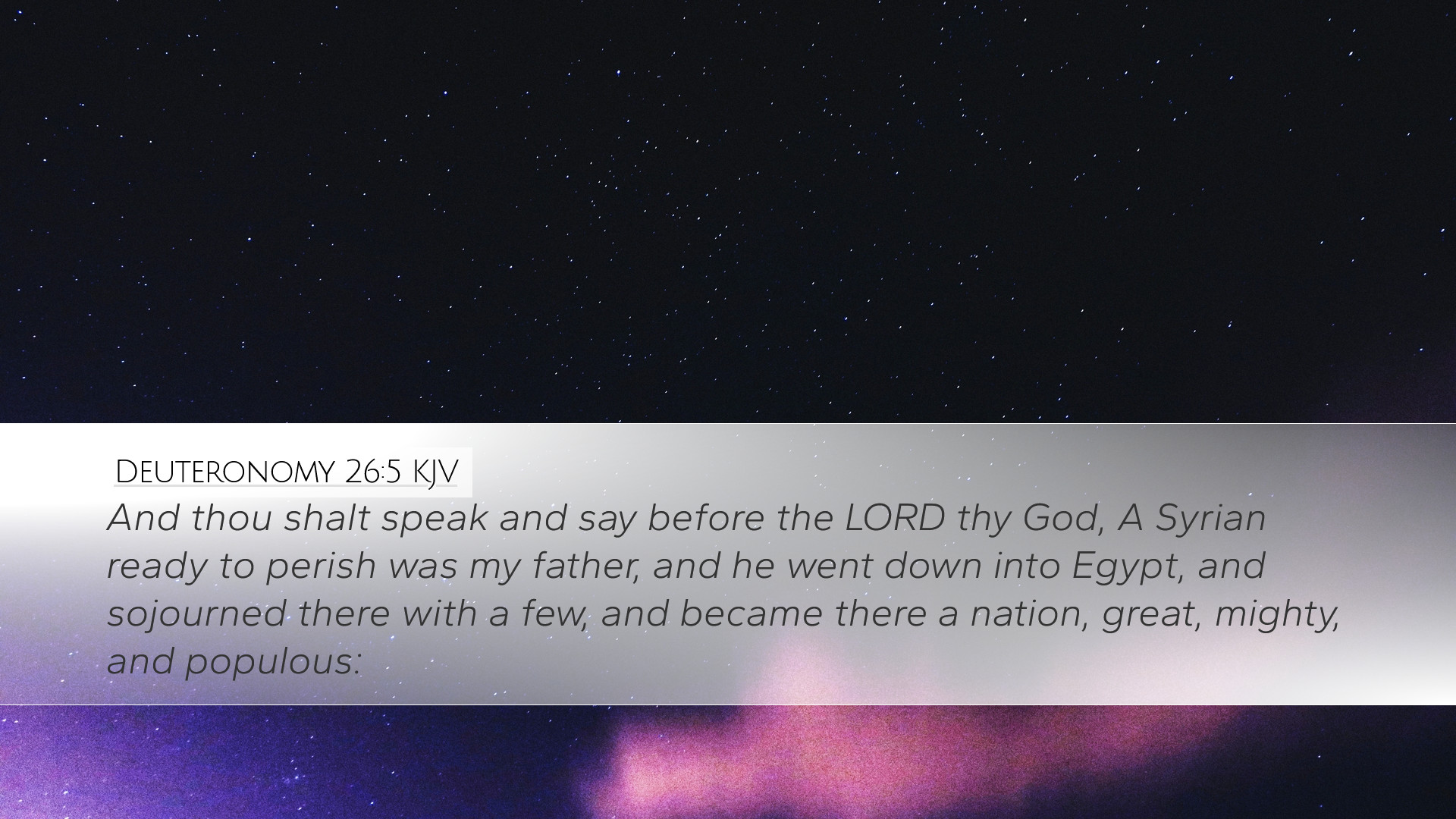Commentary on Deuteronomy 26:5
Bible Verse: "And thou shalt speak and say before the LORD thy God, A Syrian ready to perish was my father, and he went down into Egypt, and sojourned there with a few, and became there a nation, great, mighty, and populous."
Introduction
Deuteronomy 26:5 is a pivotal verse that serves as a profound reminder of the humble beginnings of the Israelites, emphasizing themes of redemption, identity, and divine providence. This commentary synthesizes insights from notable public domain sources such as Matthew Henry, Albert Barnes, and Adam Clarke, providing an in-depth exploration of the theological, historical, and practical implications of this scripture.
Contextual Analysis
To fully comprehend Deuteronomy 26:5, one must consider the larger framework of Deuteronomy, which is Moses' farewell address to the Israelites. This particular verse is part of a prescribed declaration that the Israelites were to make when offering their firstfruits, intertwining historical remembrance with ritual practice.
Historical Background
Matthew Henry emphasizes the significance of recognizing the origins of the Israelite people, who trace their lineage back to a solitary ancestor, Abraham, amidst a hostile environment. The term "A Syrian" is of particular interest, as it reflects both the geographical and cultural affiliations of Jacob's ancestry, indicating his roots in Mesopotamia.
Theological Reflections
Divine Providence
Albert Barnes argues that the mention of God's providential care is crucial; the transition from a family of few into a great nation underscores the faithfulness of God. As the Israelites proclaim their lineage, they are reminded of God’s powerful works that transform insignificance into greatness.
Identity and Heritage
Adam Clarke highlights the importance of identity and heritage in worship. By recalling their humble beginnings, the Israelites reinforce their commitment to God, recognizing that their current status as a powerful nation is entirely attributable to divine intervention rather than their own merit.
Practical Implications
The implications of this verse extend beyond historical reflection into the realms of worship, remembrance, and identity formation within the community of faith.
Worship and Remembrance
In congregational settings, this verse introduces key principles of gratitude and recognition of God’s role in salvation history. Pastors might encourage congregations to reflect on their own narratives, drawing parallels between the Israelites' journey and their personal testimonies of deliverance.
Community and Solidarity
Pastors and theologians can also harness the communal aspect of this verse, promoting a sense of unity among believers. Clarke noted that this call to remembrance creates a collective identity rooted in God's faithfulness, fostering solidarity among the church as they all share in the story of redemption.
Lessons on Humility
Furthermore, both Henry and Barnes advocate for an attitude of humility and acknowledgment of God’s grace throughout the life of faith. By embracing their origins as "a few" who became a great nation, believers are called to humility as they navigate their spiritual journeys.
Conclusion
Deuteronomy 26:5 is not merely a statement of historical fact but a profound declaration of faith that invites believers to remember their roots, acknowledge divine providence, and cultivate an identity centered on the transformative power of God. The synthesis of these commentaries offers an enriching perspective, equipping pastors, students, theologians, and Bible scholars to explore its depths and apply its truths within their contexts.


